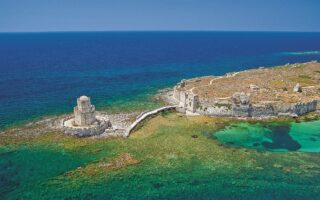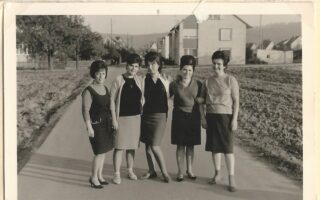A new window on the Greek Revolution
Aikaterini Laskaridis Foundation presents letters between independence fighters and fleet commander Admiral Thomas Cochrane from 1827

It was March 21, 1827, and Greek independence fighter Ioannis (the Brave) Kolokotronis was at the Attica base writing to British Admiral Thomas Cochrane, who had recently taken command of the Greek fleet by decision of the Third National Assembly at Troezen, to thank him for his advice and offer assurances that he would follow that advice in the operation for the liberation of Athens under the campaign plan of general commander Georgios Karaiskakis.
Kolokotronis noted that “all Greeks,” as well as “all friends of humanity,” owed Cochrane a debt of gratitude for his timely contribution to the struggle against Ottoman rule. He ended the highly complimentary missive by apologizing for his delay in writing, explaining that he had been busy with the Athens campaign.
“The manner of his address, the things he wrote, are quite fascinating,” says Dr Konstantinos Thanasakis, head of the Department of Digital Humanities and manager of Research Programs & Publications at the Aikaterini Laskaridis Foundation.
“‘Brave’ Kolokotronis was extremely courteous and sentimental in his letter, because he was among those Greeks who welcomed Cochrane’s arrival. We are, after all, talking about a key figure in the British navy and in British diplomacy. He is, indeed, regarded as a controversial figure and has been accused in the literature over his part in the Greek Revolution, but everyone was writing to him at the time, asking for his help,” explains the historian.
Cochrane, adds Thanasakis, “had been very successful, especially from 1823 onward, and Britain was a great power, in whose assistance the Greeks were investing.”
Indeed, Thomas Cochrane, 10th Earl of Dundonald, born in Lanarkshire in Scotland, was already regarded as successful for his role in the Napoleonic Wars. It is even said that Bonaparte had nicknamed the Royal Navy officer Loup des Mers, or Sea Wolf. In 1814, however, Cochrane was accused of stock exchange fraud and was expelled from the navy, only to win back a reputation as commander of the Chilean fleet in its campaign in Peru and against Spanish rule, as well as in Brazil’s fight for independence from Portugal, before joining the Greeks.
“In 1825, Cochrane mediated two external loans for Greece and signed an agreement for commanding the Greek fleet with the committee that was negotiating the loans,” explains Thanasakis. “The loans were necessary for many reasons, one of which was to pay the salary of the fleet’s commander. So Cochrane had a personal interest in the affair, as would anyone else.”
Cochrane received 37,000 pounds sterling and spent less than a year in Greece; his departure was rather sudden. But the letters he received during that time from Greek revolutionary fighters and politicians, as well as from British counterparts in Greece, were so numerous that they form the “Greek section” of the Cochrane papers, which are held by the National Records of Scotland.
What, however, came into the possession of the Aikaterini Laskaridis Foundation, and how? Cochrane’s entire archive had passed down to Douglas Dundonald, a descendant of the admiral and a true lover of modern Greece. “As you can understand, it is not something that a person can simply keep at home,” explains Thanasakis. “It is a very big archive, as Cochrane was incredibly active and had an incredible reach, stretching all the way to Brazil. So, Dundonald handed the archive over to the National Records of Scotland for safekeeping. Once it was there, Dundonald, who is married to a Greek, agreed to have the part of the archive that pertained to Greece handed over to the Aikaterini Laskaridis Foundation. It contains the correspondence and all the letters that he received from the Greek chieftains of the war of independence, as well as from various famous and official personages of the time, from politicians of the newly established Greek state, but also from peers, that is other Britons acting in Greece at the time. This ‘Greek’ part of the Cochrane archive was handed over to the Aikaterini Laskaridis Foundation three years ago in digital form, with the obligation that we process it and make it available online, for free. The reason he chose this foundation is because of its avid involvement in naval history. Its love for all things maritime is well known, and it has gone to great lengths to publicize this archive.”
‘The Greeks put their hopes into the British navy. By writing to Cochrane it was as if they were writing to the British government, because they hoped their demands would be conveyed up the hierarchy’
Indeed, Thanasakis and his associates copied 1,270 letters that Cochrane received while he was in Greece and transcribed their contents into digital files so that the information can be used in research, can be translated into other languages etc. They can be found at laskaridisfoundationarchives.org.
“Some of the more poorly written letters required specialized knowledge in old forms of writing to be transcribed,” explains Thanasakis. “It was, overall, a very time-consuming process, which even big organizations would not usually undertake. It is, however, the only thing to be done for the researchers.”
But why was Admiral Cochrane regarded as such a controversial figure by some? Among other reasons, there were certain bad calls he made during the operation for Athens’ liberation. According to one school of thought, Cochrane, like Richard Church, who was given command of the land army by the Troezen Assembly, introduced war tactics that were incompatible with the ones that were familiar to the Greeks. The disastrous Battle of Analatos, on the eve of which Georgios Karaiskakis was killed, was one of the results of this. The Greek chieftain is known to have had reservations about the battle plan but he had not expressed them openly to Cochrane, though he did invite him for a meeting at the camp in Keratsini. In a letter dated April 6, 1827, Karaiskakis expressed how happy he would be to receive him at the camp, where he would be welcomed by the Greek troops who were awaiting his encouragement. “The generals and the soldiers will not be happy until they see you in person,” he added at the end of the letter, with diplomatic tact.
“The correspondence between them was extensive. We have 13 of the letters written by the Greek chieftain and while the relationship was clearly tense, we never see Karaiskakis writing something like ‘my dear admiral, you are mistaken,'” says Thanasakis. The letters referring to the two can be separated into three categories, he adds: those in which Karaiskakis is asking Cochrane for assistance (food), those in which he’s briefing him on military matters (Yannis Makriyannis needs more ships, crews haven’t been paid their salaries etc) and those referring to Karaiskakis but written by others, like British naval officer Frank Hastings.
One of the letters about Karaiskakis, dated April 26, 1827, and signed by the chairman of the Troezen Assembly, announced the chieftain’s death: “Greece!” it proclaims in the second paragraph. “Lament the death of your precious Karaiskakis! Women of Greece, dress in black for the defender of your honor! Philhellenes and Greek soldiers, grieve for your brave brother in arms and, soaking the sacred ground of glorious Athens with your heartfelt tears, avenge his blood, punish his most impious murders and save Athens!”
In June 1827, the secretary of state for naval affairs, Georgios Glarakis, expressed his sympathy for Cochrane’s failed campaign in Egypt and wished him success in the future. In September of that same year, Theodoros Kolokotronis wrote a letter summing up the plan of resistance against Ibrahim Pasha and asking for food and military supplies: “Have no doubt that you will be doing us a great favor,” he wrote. Then in October, a group of community leaders and citizens of Poros asked Cochrane to take action against the pirate Giannis Moros, after he attacked a boat carrying lemons. In November, meanwhile, the Greek government informed him that the sultan would not agree to a truce despite the Turkish fleet’s defeat in the Battle of Navarino, so Cochrane was asked to continue his naval operations.
“The Greeks put their hopes into the British navy,” comments Thanasakis. “By writing to Cochrane it was as if they were writing to the British government, because they hoped their demands would be conveyed up the hierarchy. In his letters, Alexandros Mavrokordatos in particular, makes references to other leading figures from Britain and from the other great powers, such as [the Duke of] Wellington and [Lodewijk van] Heiden. This archive sheds light on this ‘network’ that Greek chieftains and politicians were trying to create with Britain, through Cochrane.”

So, what can we conclude about Cochrane? Was he, as historian Dionysios Kokkinos (1884-1967) described in his book “The Greek Revolution” a “pompous charlatan”?
“I’m not sure such a description tells us much,” notes Thanasakis. “It is true that he was very keen on public relations. Was his contribution to the independence struggle catalytic? Perhaps. He was responsible for many defeats and paid the price for them. But he also contributed to the reconciliation between rival parties in the Third National Assembly. The Greek Revolution was being discussed at the highest echelons of the British government and the British navy was here. I would say that he remains a controversial figure, at least from a military standpoint, and that his correspondence is exceedingly interesting. It would, of course, be useful to see how he handled all these different demands. Did he answer these letters? Did he say, ‘Yes, of course we will help.’ Was he a conscientious correspondent, did he write to everybody? We do not know, because a great number of his own letters are not in his archive.”
Thanasakis and the Aikaterini Laskaridis Foundation expect that the Cochrane archive will not only prove useful to the research and education communities, but will also lead to publications.
Furthermore, says the historian, the foundation recently acquired the archive of Admiral Edward Codrington too. “It is bigger and comprises the entire body of his correspondence, as well as many ship logs. It is a lot of material and we’re still going through it. We believe that by the bicentennial of the Battle of Navarino, in 2027, we will have a very substantial collection of records that will contribute to a more systematic study of Greek naval history.”





